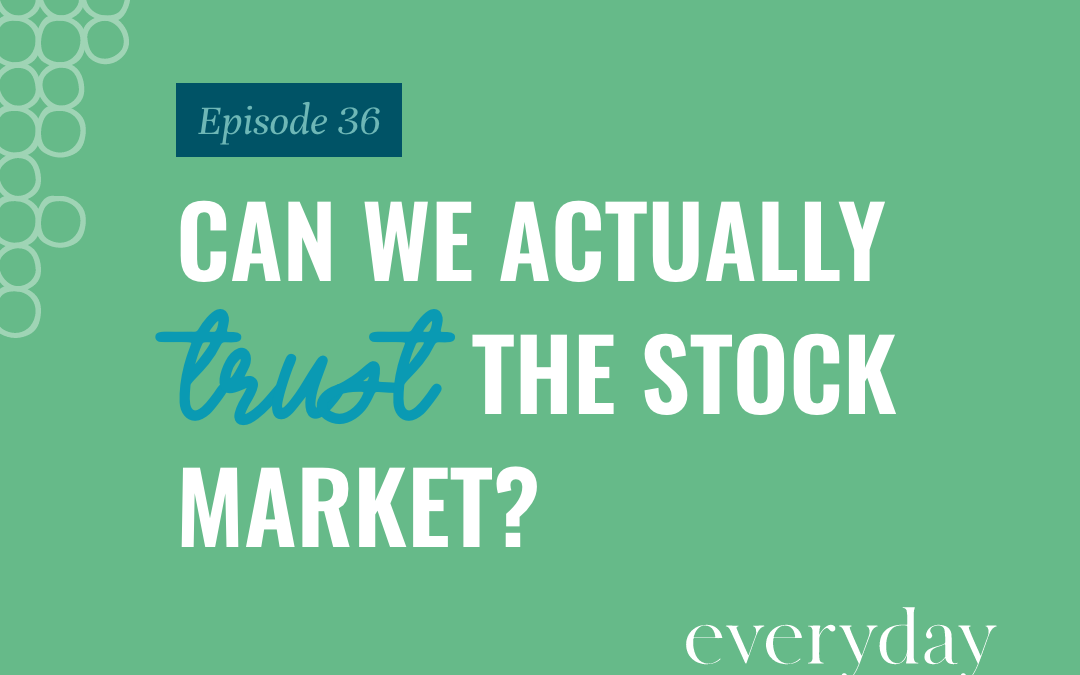Let’s be honest – the stock market isn’t a very welcoming place right now. Many of my clients, especially younger investors, are wondering whether they should continue investing in stocks.
All the questions really boil down to this one: How can we trust the stock market?
And I totally understand that uncertainty. I’ve had clients and even family members who have lost a big portion of their portfolio thanks to tanking stock values.
That’s definitely a painful situation that shouldn’t be taken lightly. But there’s another side to the coin – for many people, stock market investments are a fundamental piece of their retirement plan.
At the end of the day, the key is to balance the risks and rewards of investing in the stock market.
Context Is Everything
When I have a client who is panicking about the stock market and talking about losing 30% of their retirement portfolio, I like to step back and ask a couple questions.
First, is it still down by that much? It might be, but the stock market changes quickly, so that number may have changed too. I don’t automatically know the exact details of everyone’s portfolio, so I always like to ask for clarification.
The second question is about context. What factors contributed to that loss? Of course, the market itself has taken some big hits recently (the S&P 500 was down 19.5% in 2022), but the value of individual stocks varies drastically.
The Dangers of Single-Stock Investments
One of the biggest risks of investing in the stock market is putting all your money into a single stock. Let’s look at Tesla, for example. By the end of 2022, Tesla shares were down 65% (far worse than the market average). That means someone who had invested $100,000 in Tesla would now have an investment worth only $35,000. That’s a huge loss!
Obviously, one of the ways to manage a situation like this is to not be entirely invested in only one company. Even though the market is down overall, there are definitely stocks that did much better than Tesla. So I like to talk to my clients about how they’re choosing which stocks to invest in.
Developing a Better Strategy
Stocks should be just one piece of your overall financial picture. Financial planning is all about building a comprehensive strategy that includes contingencies.
When I talk with my clients about investing, we always go over the hard questions: what happens when the market goes down? What’s the strategy for dealing with that?
Take Care of the Basics First
Because the stock market is often unpredictable, especially in the short term, it’s not generally what you want to rely on for your immediate financial needs. I always recommend having a healthy emergency fund before putting money into the stock market.
If you’re relying on your portfolio for all of your income, it can be scary. If you suddenly need to pay for a hospital visit or replace a broken water heater, you wouldn’t want to pull that money from your investment portfolio, especially when the market is down.
Managing Risk
Investing in the stock market always comes down to managing risk. And it’s a balance – low-risk investments are generally low-reward as well. So it’s also wise to have some high-risk, high-reward investments in your portfolio.
The key is to figure out where your income is going to come from, especially as you approach retirement. You don’t want to be relying solely on those stocks that are down 20% – you want to have other income sources so you can hold onto those down investments until they recover.
As scary as it is to read that the market is down 20%, there’s also an upside: Now is a great time to invest.
Putting money into the stock market can feel frightening because we don’t know what will happen. But investing in stocks means betting on people and their ability to innovate. You’re trusting that the humans in those companies are going to adapt, invent, and find ways to overcome challenges. And I think that’s a pretty safe bet.
Stock Market Successes
Sometimes, it feels like the stock market just isn’t worth it, especially during times like this when things are unpredictable and often negative. But there are countless stories of people who have successfully invested in the stock market.
Just before I recorded this episode, I got an email from a client who was writing to tell me that she had just officially retired. I’d worked with her for years and we’d spent a lot of time planning for her retirement, so it was so exciting to hear that all that work paid off. She did it, and honestly, a large part of her retirement funds came from long-term stock market investments.
The stock market is complicated, and investments shouldn’t be taken lightly. The best thing you can do is educate yourself and get as much information as possible before you invest. Check out some of my other podcast episodes and blog posts on the stock market. If you commit to doing the research, you can absolutely make wise, informed decisions about stock investments.
See you next week!

